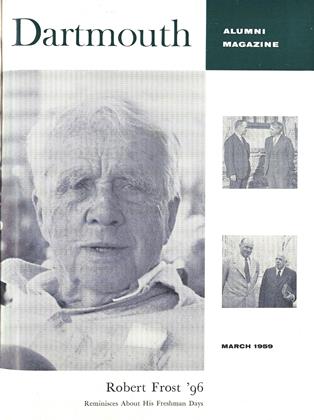THE Buck Rogers influence is creeping up on the College. Totally aside from the innumerable and unspeakable gadgets that serve the sciences and other academic disciplines and the maintenance department, the joint is crawling with girl-saving machines and various substitutes for cottage industry. Addressographs, mimeographs, photostats, tape recorders, multiliths, dictaphones, coke machines, Verifax, light meters, cigarette and candy vendors, collators, record players, art gum, ozalid, liquid duplicators (for cocktail parties), Copease, and staple removers - in fact, almost everything but Boy Scout knives with attachments to pry stones from horses' hooves.
Samuel Butler says in Erewhon, "There is no security against the ultimate development of mechanical consciousness," and we are approaching this in our latest and most elaborate installation: the Tabulating Center. Down in the southwest corner of the College Hall cellar, in what used to be the old Grill Room and, for a brief period, a bierstube, is located a battery of IBM machines, all office gray and chromium, kept happy by a boss and three assistants, who feed and re-feed some 100,000 cards a year into the insatiable maws of a key punch, a sorting machine, an accounting machine, a collator, a reproducing summary punch, and a card interpreter.
None of this is on the cuff. The machines are rented, the staff is hired, and the cards are purchased and then strown broadcast among the undergraduates and faculty. A prospective student has to do no more than be accepted for admission to the College in order to become a punched card: to be assigned an appropriate alphabetical spot among almost a million possibilities and to have his full name, class, home and college addresses, and parents' names all chopped out in little rectangular holes, any or all of which information can be translated into printing on other cards or class lists or grade reports. If he persists in a Dartmouth career, his test scores, marks and averages, and shifts of habitation are carried along, so that by his baccalaureate he is thoroughly perforated - though by no means to the full extent of the machines' capabilities.
Once the initial punching is done by hand, it is no trick at all to duplicate cards, make lists, run off mailing labels, or go on probation. This is all consummated by magic and electric impulses in appalling apparati that will do simple arithmetic and almost anything else you tell them to except say "Uncle." Practically all the paper work of the Registrar's office is now mechanized, including some 2500 course changes at registration for each term.
Meanwhile, if anyone wants a tabulation of a college class, a teaching section, the natives of Sleepy Eye, Minn., or all students whose middle names begin with K, it is but the work of moments to clatter the cards through the sorter, put the lucky ones into the accounting machine, and, lippety lippety, come up with a printed list. The tricky part - the gizmo - is setting up the control panels, which look like cribbage boards designed for seventeen simultaneous games —as fascinating as four-dimensional tic-tac-toe. The pegs come in wire-hitched pairs, and if you place them well and truly (and don't forget one for his Nibs) all you then have to do is slap the marching orders into the machine and push a button.
In addition to the demands of the Registrar, there is extensive use of the IBM installation by the Admissions Office, various academic departments, extracurricular groups, and mere curious seekers of esoterica. Even fraternity pledging has been re-tooled to fit the demands of machine treatment.
So far, the tabulation has been limited to undergraduates, who are young and resilient and don't mind a few perforations. But our observation is that alumni, as they mature, tend to rebound less and less when dropped from the same height, and to date no plot is afoot to translate them into punched cards. We would advise caution in this area, for even though their dividend checks and Reader's Digest subscription forms may be automatically processed, the alumni might well resent an over-mechanization of their filial bonds and still prefer the highly personalized form letter as a tie to the Old Mother.
 View Full Issue
View Full Issue
More From This Issue
-
 Feature
FeatureFRESHMAN DAYS...
March 1959 By EDWARD CONNERY LATHEM '51 -
 Feature
Feature"Spoiled Children" of Hanover: A Letter from Charles Doe, 1849
March 1959 By JOHN P. REID -
 Feature
FeatureSCHOOLMARMS, GRAMMARIANS and ANARCHISTS
March 1959 By ROBERT S. BURGER -
 Class Notes
Class Notes1918
March 1959 By THOMAS E. SHIRLEY, W. CURTIS GLOVER, RICHARD P. WHITE -
 Class Notes
Class Notes1950
March 1959 By SCOTT C. OLIN, SIMON J. MORAND III -
 Class Notes
Class Notes1926
March 1959 By ROBERT L. MAY, EDWARD J. HANLON, BRUCE W. EAKEN
BILL MCCARTER '19
-
 Article
ArticleNot So Long Ago .... Cry Havoc!
December 1933 By Bill McCarter '19 -
 Article
ArticleThe Hanover Scene
February 1953 By BILL McCARTER '19 -
 Article
ArticleThe Hanover Scene
March 1955 By BILL McCARTER '19 -
 Article
ArticleThe Hanover Scene
October 1955 By BILL McCARTER '19 -
 Article
ArticleTHE HANOVER SCENE
FEBRUARY 1959 By BILL MCCARTER '19 -
 Article
ArticleTHE HANOVER SCENE
MAY 1959 By BILL McCARTER '19







